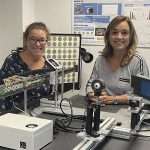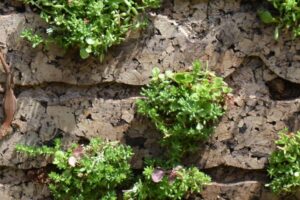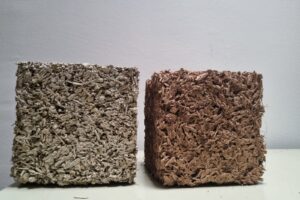
New biodegradable fragrance microencapsulation techniques for detergents to avoid the release of microplastics into the environment
November 28, 2023
New photonics and artificial intelligence tools to diagnose ocular, cardiovascular and neurodegenerative diseases
December 15, 202329/11/2023
The protection of infrastructures is a commercial and environmental challenge as it enables the useful life of these elements to be lengthened and avoids the early generation of residues.
The company AZVI, together with the Centre for Advanced Technologies in Mechanics (CATMech) at the Universitat Politècnica de Catalunya - BarcelonaTech (UPC) and the UPC spin-off Composite Structural Engineering Solutions, SL (CSES) are working on the SAFEPASS project to study the protection of concrete bridges over motorways that are regularly affected by impacts of vehicles travelling with excess height.
SAFEPASS has several objectives. First, the aim is to ensure that no rubble detaches due to impacts, which ensures the safety of road users. Second, if an impact happens, the aim is to ensure that this does not compromise the durability of the structure, as the coating limits the penetration of agents (for example, water, oxygen and aggressive chemical products such as sulphates) that promote oxidation of the reinforcing bars. Third, the aim is to generate a damage detection system that can warn of a possible impact on the bridge deck, locate this impact and assess how severely it has affected the structure.
To achieve these objectives, a polyurea coating is proposed that will be studied from the theoretical perspective and through experimental tests to characterise this material and the structural response of concrete test specimens protected with polyurea against impacts. In this line, the capacity of polyurea to protect reinforced and prestressed concrete from corrosion will also be assessed. Finally, low-cost piezoelectric elements such as impact sensors will be used, due to their passive nature and their effective response to dynamic actions. Their output signals will contribute to categorising the damage level.
CATMech-UPC has extensive experience in the use of piezoelectric elements in mechanical systems and has suitable infrastructure for undertaking mechanical tests of greater complexity (impacts).
The expected results are being able to completely avoid detachments, lengthen the useful life of the infrastructures studied by 20% and identify the occurrence of a destructive impact, without false negatives.
Budget and funding
The project, which started in July 2022, has CDTI funding through the contract IDI-20221087. In addition, the collaboration of Tecnopol should be noted, which is a leader in the production of polyureas. CATMech-UPC, through a collaboration agreement that will end in December 2024, will handle a budget of €70,000.00 to develop the project.


Figure 1. Preliminary tests of polyurea under traction, with an elongation of over six times its original size.
Related Projects
- A research team from the inLab FIB at the Universitat Politècnica de Catalunya - BarcelonaTech (UPC), together with the Asociación de Personas con Movilidad Reducida (AsoPMR), has taken part in the Spot4Dis project to enhance the mobility and autonomy of people with reduced mobility.
- The La Volta project foresees the construction of a large Catalan vault pergola within the Llars Mundet campus, in the Montbau neighbourhood (Horta-Guinardó district). This structure will become a new architectural landmark for Barcelona, combining traditional construction techniques with contemporary innovation. The project involves the Rehabilitation and Architectural Restoration Research Group (REARQ), at the Universitat Politècnica de Catalunya - BarcelonaTech (UPC), and is led by the Architects’ Association of Catalonia (COAC) and the Barcelona Provincial Council.
SATE-VEG: A system for energy renovation of buildings that helps reduce the urban heat island effect
Researchers from the Architecture, Energy and Environment (AiEM) group at the Universitat Politècnica de Catalunya - BarcelonaTech (UPC) have developed SATE-VEG, an external thermal insulation system with a vegetal coating that offers seasonally adaptive thermal behaviour, enhances urban biodiversity and promotes positive health effects. The system is made from organic materials, requires low maintenance and consumes minimal water.- A research team from the Interdisciplinary Group on Building Science and Technology (GICITED) at the Universitat Politècnica de Catalunya – BarcelonaTech (UPC) is leading the BioSAFE project, which aims to develop sustainable building envelopes —mainly façades— designed according to sustainability, comfort and safety criteria, with particular attention to their acoustic behaviour and fire performance.




